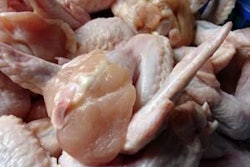
Only 20 years after it opened its first factory in Liaoning province, Hong-Kong-based DaChan Foods (Asia) Limited has become China’s largest supplier of chickens, slaughtering 200 million birds each year.
The company is not resting on its laurels, however. DaChan Foods is aiming to slaughter 1.2 billion birds annually – amounting to 10 percent of the market – as China’s estimated annual consumption heads towards 12 billion birds, says DaChan chairman Han Jiahuan.
The company does not only have its sights fixed on volumes. DaChan Foods has gradually adjusted its product mix, moving towards products with higher margins. In the future, its three major product lines – chickens, feed and processed meat – are each likely to account for a third of revenue, Mr Han says.
For the first six months of this year, DaChan Food reported total sales revenues of US$561 million. Revenues for meat, feed and processed food reached US$288 million, US$244 million, and US$28 million, respectively.
DaChan Food carved out its name in the wholesale market, but now, with its traceable products, and following China’s food safety crisis, the company is looking for new opportunities in the retail market.
Growth plans
During the US presidential campaign of 1928, Herbert Hoover promised that there would be a “chicken in every pot”. Some 90 years later, DaChan Foods is trying to emulate this, aiming for a chicken in every household through its rising production capacity.
Currently, DaChan Food operates 10 complexes, with an average annual capacity of 20 million birds. The complexes are located in Tianjin and the four northern provinces of Liaoning, Hebei, Shangdong and Anhui.
Most of these sites now carry out integrated production, including the production of feed, day-old chicks and broilers, slaughter and meat processing. However, more than 80 percent of DaChan’s broiler production is outsourced to some 4,000 contracted farmers, working under the company’s management and supervision.
Mr Han continues: “We have acquired two complexes each year since 2008. It is important for a large company such as DaChan Food to maintain a 10-20 percent growth rate.”
The company has plans to build a further 50 integrated operations throughout China, with an average annual capacity of 20 million birds, resulting in a 500 percent capacity increase.
Serving the market
The plan indicates that the new sites will be located across 20 regions, allowing the company to serve major cities beyond North China, which is currently DaChan’s main production focus.
“We are targeting all of China’s major metropolises,” explains Mr Han, “as, at the moment, we can only distribute fresh meat to cities that are close to our current production complexes, such as Beijing and Shanghai, and not the southwestern cities such as Chongqing and Chengdu.”
Adjusted product mix
Broiler meat, feed and processed food accounted for 51 percent, 44 percent and 5 percent of the company’s revenue during the first half of 2009.
While DaChan’s processed food activities are insignificant in comparison with its other activities, it is this part of the business that will be of increasing focus due to rising demand and higher margins.
“China currently has great potential for producers of processed food,” Mr Han argues. “This is because ever more people, especially the younger generation, are eating outside of the home, or buying ready-to-cook meat.”
According to a report in the local newspaper Wenweipo, published in 2008, revenues from DaChan’s processed food activities grew by 48 percent year-on-year over the preceding three years.
More recently, the Chinese market has experienced difficulties, but DaChan’s processed food division has managed to continue growing.
The Consumer Confidence Index (CCI), an important measure of customers’ purchasing intentions, slumped by 7.6 percentage points between June 2008 and June 2009. Over the first six months of 2009, however, DaChan’s processed food revenues grew by 4 percent to stand at US$28 million. Over the same period, revenues from feed and meat sales contracted by 16 percent and 10.5 percent, respectively.
Gross profit for feed and meat reached only 12.7 percent and 2 percent over the period, while the gross profit rate for processed food stood at 17.6 percent.
Relationships
Like many of the larger chicken producers in China, DaChan Food works closely with domestic foodservice providers and distributors. These arrangements are likely to continue, despite the company also moving towards selling directly to consumers. Some 15-20 percent of the company’s broiler meat is currently sold to foodservice concerns such as KFC, McDonalds and Dicos.
In June, US-based Yum! Co. signed a three year purchasing agreement worth Yuan 5 billion (US$732 million with DaChan and two other local producers. Of this total, Yuan 1.7 billion will go to DaChan.
Beyond foodservice, DaChan also works with other distribution channels, including school cafeteria and business canteens.
More than 20 percent of the company’s products – broiler meat and processed food – is sold directly to customers via supermarkets, convenience stores, and through DaChan’s own stores.
Traceability
Since June this year, DaChan has issued a unique number for each product sold under its Sisters Kitchen brand. By entering this number into the internet, or sending by mobile phone, customers can access detailed information for each product, including feed source, chicken producer, butcher and processor.
“Food safety scandals, for example milk powder contaminated with melamine, mean that food quality must be given greater attention,” says Mr Han.
“DaChan has been developing its product traceability system for a long time, and we are now making it available to customers online, which will raise our reputation.”















